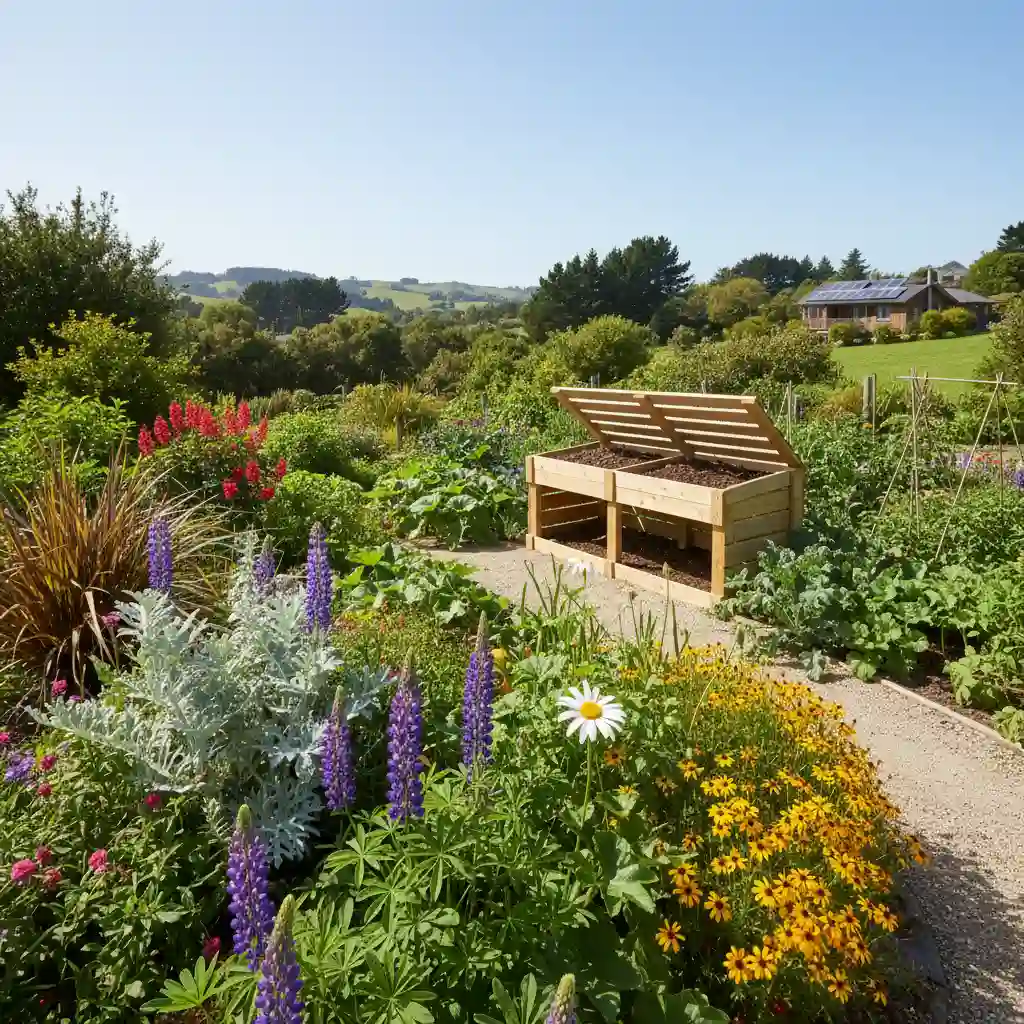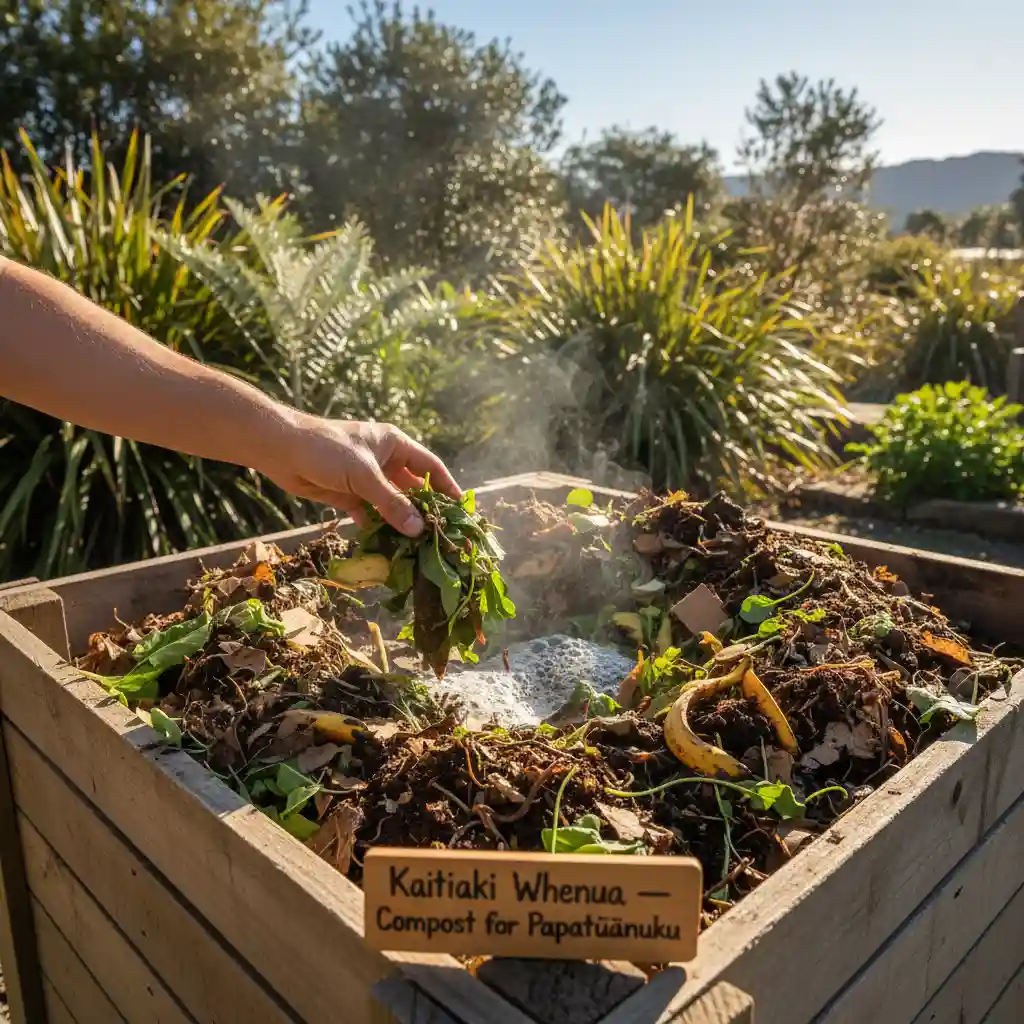Year-Round Composting Tips for Sustainable Living in NZ
Transforming kitchen scraps and garden waste into nutrient-rich soil is a cornerstone of sustainable living. For New Zealanders, understanding how to maintain a thriving compost system throughout all four seasons is key to maximising its benefits. This comprehensive guide provides expert, actionable strategies to ensure your compost bin remains a hardworking hub, regardless of the weather in Aotearoa.
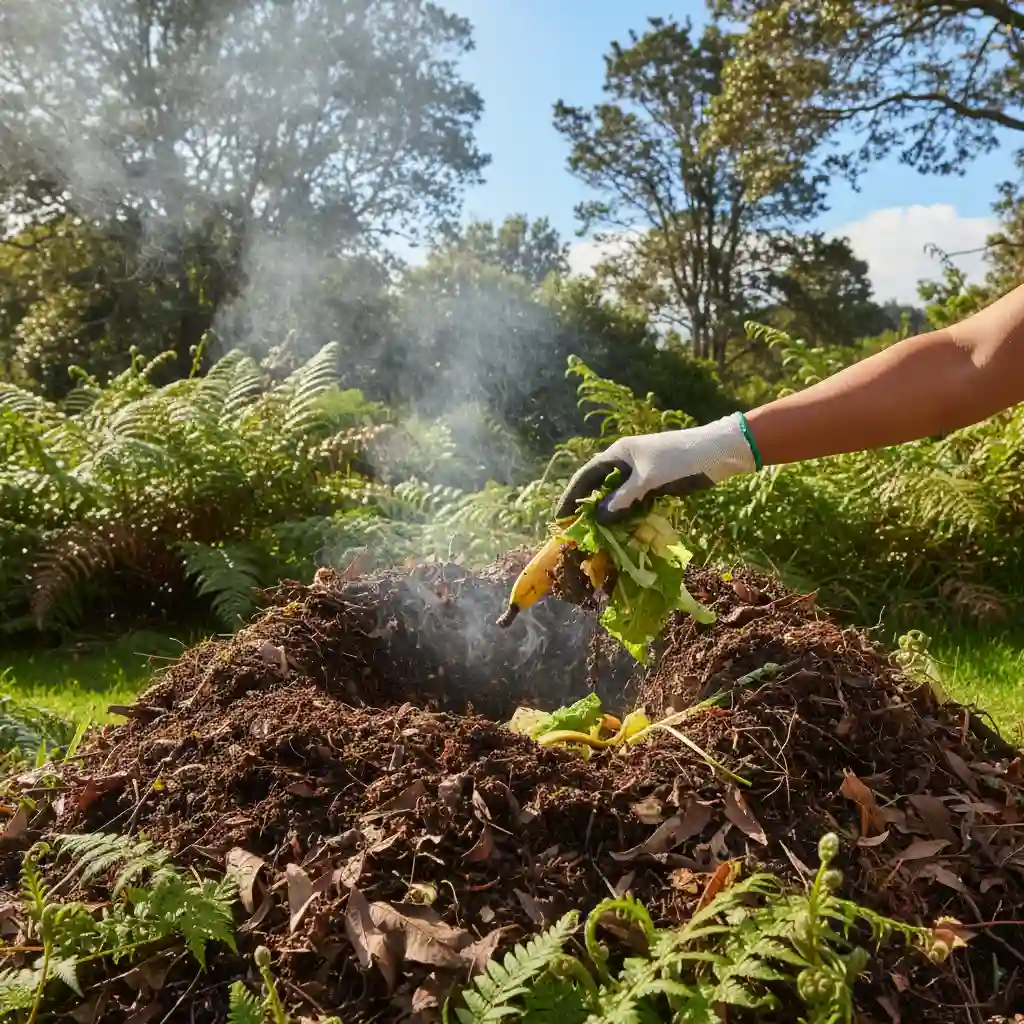
Table of Contents
- Why Year-Round Composting Matters in Aotearoa
- Essential Gear for Your NZ Composting Journey
- Seasonal Strategies: Mastering Composting Through the NZ Year
- Troubleshooting Common Composting Challenges
- Maximising Your Compost’s Potential
- Action Checklist: Your Year-Round Composting Success Plan
- Frequently Asked Questions
- References & Sources
Why Year-Round Composting Matters in Aotearoa
Composting is more than just waste diversion; it’s a powerful tool for environmental stewardship right in your backyard. In New Zealand, a nation celebrated for its natural beauty, diverting organic waste from landfills is critical. Organic matter in landfills produces methane, a potent greenhouse gas contributing significantly to climate change.
By embracing year-round composting tips for sustainable living in NZ, you actively reduce your carbon footprint, enrich your garden soil, and foster a healthier ecosystem. Our unique climate, with its regional variations, means a consistent composting approach is essential to maintain efficiency through every season.
Did you know?
Stat Callout: Organic waste makes up roughly a third of household waste sent to New Zealand landfills. Composting just your food scraps and garden waste can significantly reduce this, preventing harmful methane emissions and creating valuable soil amendment instead. (Source: Ministry for the Environment)
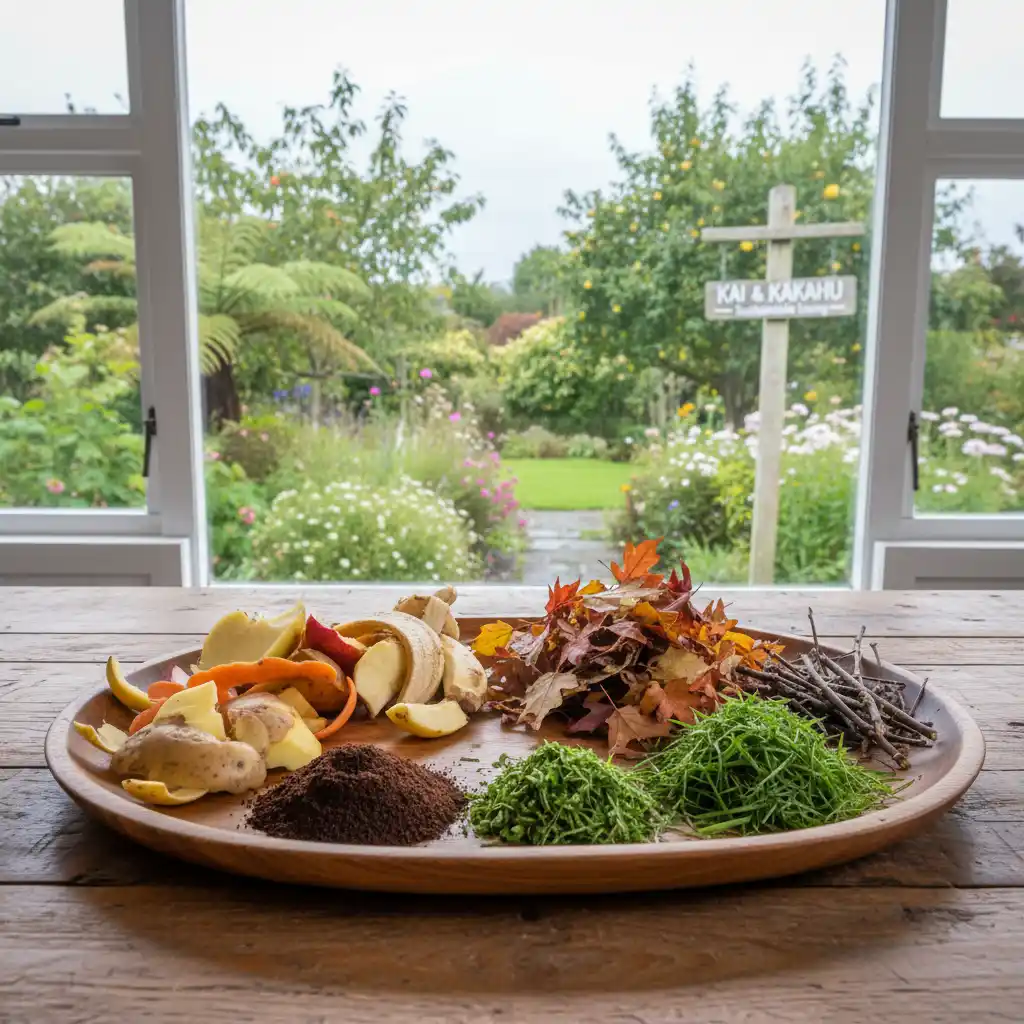
Essential Gear for Your NZ Composting Journey
No matter your space or lifestyle, there’s a composting method for you. Understanding the basic options will help you select the best approach for continuous, year-round success.
- Traditional Compost Bin/Pile: Ideal for larger gardens, these bins (or open piles) break down organic matter through microbial action. They require regular turning and a good mix of ‘greens’ (nitrogen-rich) and ‘browns’ (carbon-rich).
- Worm Farm (Vermicomposting): Excellent for smaller spaces and processing kitchen scraps. Worm farms use specific earthworms (like tiger worms) to digest food waste, producing nutrient-rich ‘worm castings’ and ‘worm tea’. They are particularly good for continuous, low-odour composting.
- Bokashi Bins: An anaerobic (oxygen-free) fermentation system that ‘pickles’ food waste, including items not typically composted like meat and dairy. The fermented material then needs to be buried or added to a compost bin to break down further. It’s a great pre-composting step for year-round food waste management.
“Choosing the right composting system for your needs is the first step towards consistent, year-round success. Each method offers unique advantages tailored to different scales and types of organic waste.”
Seasonal Strategies: Mastering Composting Through the NZ Year
New Zealand’s varied climate means adjusting your composting technique is crucial. Here are our top year-round composting tips for sustainable living in NZ, broken down by season.
1. Spring: Reinvigorate and Replenish
As temperatures rise, your compost activity will accelerate. This is a prime time to get your system ready for a productive year.
- Kickstart Activity: If your pile slowed over winter, give it a good turn. Add a fresh layer of ‘greens’ like new grass clippings, fresh kitchen scraps, or even a handful of compost activator.
- Maintain Balance: Aim for a good green-to-brown ratio (roughly 1 part green to 2 parts brown). Spring often brings an abundance of green garden waste.
- Check Moisture: Ensure the pile is moist like a wrung-out sponge. Add water if too dry, or more browns if too wet.
2. Summer: Heat, Hydration, and Harmony
Summer’s warmth is fantastic for decomposition, but it also brings challenges like drying out and potential odours.
- Stay Hydrated: Compost needs moisture to thrive. Water your pile regularly, especially during dry spells, or incorporate juicy fruit/veg scraps.
- Turn Regularly: Frequent turning (weekly or fortnightly) helps aerate the pile, distributes moisture, and keeps temperatures even. This is crucial for hot composting.
- Cover Up: A lid or tarp prevents excessive drying and deters pests.
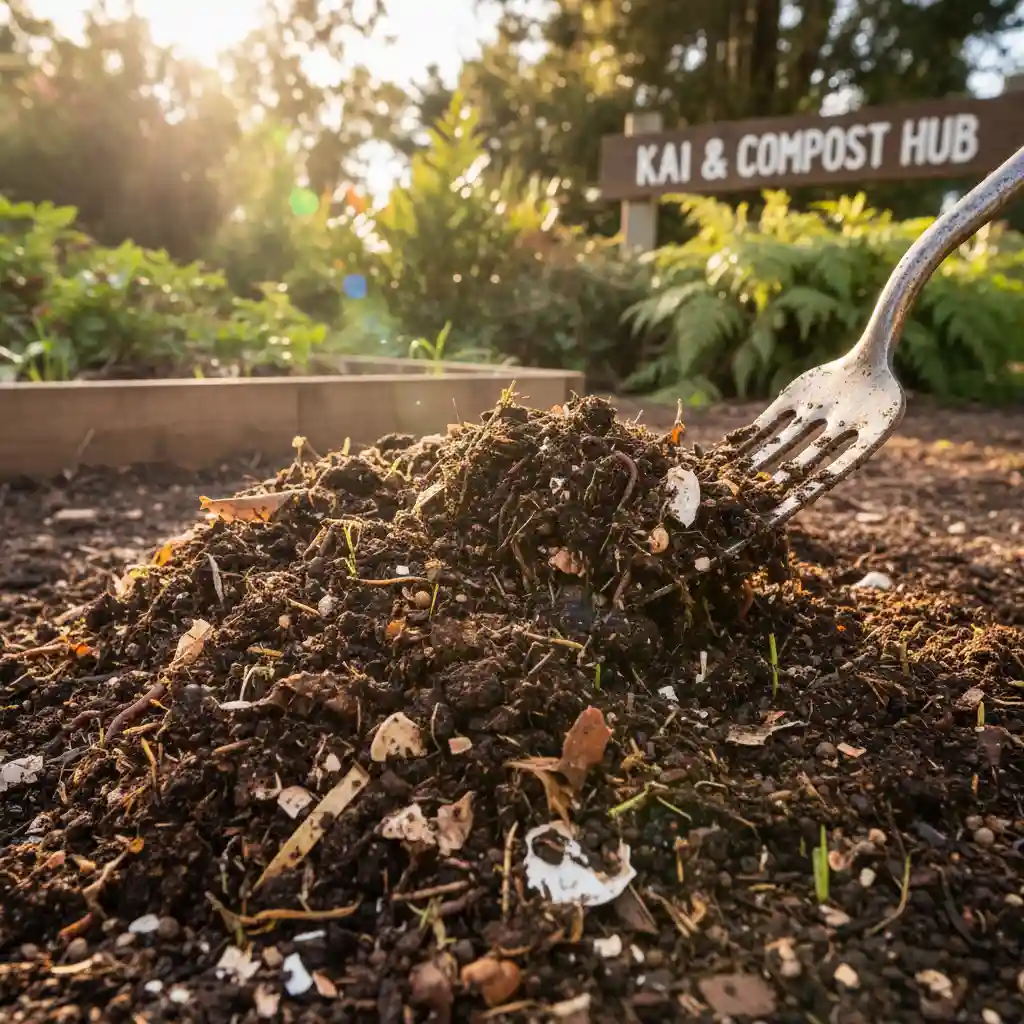
3. Autumn: The Art of Layering and Leaf Litter
Autumn is nature’s gift to composters, providing an abundance of ‘brown’ materials.
- Collect Leaf Litter: Fallen leaves are gold! Rake and add them in layers, or store them in bags to use as brown material throughout the year. Shredding them first accelerates breakdown.
- Balance Act: As garden greens diminish, ensure you’re still adding enough nitrogen (kitchen scraps, fresh grass clippings) to balance the influx of carbon-rich leaves.
- Prepare for Winter: Build up your pile with a good mix to allow it to continue breaking down slowly during colder months.
4. Winter: Keeping Warm and Working Wonders
Composting slows down in winter, but it doesn’t stop. With a few adjustments, you can keep your system active.
- Insulate Your Bin: Wrap your compost bin with old carpet, cardboard, or bubble wrap to retain heat. For worm farms, move them to a sheltered spot or indoors.
- Smaller Additions: In colder weather, bacteria are less active. Add smaller pieces of food waste to speed up decomposition.
- Reduce Turning: Less turning helps maintain any warmth the pile generates.
- Bokashi Power: This is an excellent time to use Bokashi bins for kitchen scraps, as the anaerobic process is less temperature-dependent, and the fermented waste can be buried or added to the compost in spring.
Troubleshooting Common Composting Challenges
Even experienced composters encounter issues. Here’s how to tackle them:
- Odour: Often a sign of too much nitrogen (greens) or lack of aeration. Add more ‘browns’ (carbon-rich materials like dry leaves, shredded cardboard) and turn the pile.
- Pests (Flies, Rodents): Ensure food scraps are always buried beneath layers of brown material. Keep your bin covered. Avoid adding meat, dairy, or oily foods to open compost bins; use a Bokashi system for these.
- Slow Decomposition: Usually due to lack of moisture, aeration, or an imbalance of greens/browns. Check moisture, turn the pile, and adjust your green/brown ratio. Shredding materials into smaller pieces also helps.
Maximising Your Compost’s Potential
Once your compost is ready – dark, crumbly, and earthy-smelling – it’s time to reap the rewards!
- Garden Booster: Mix finished compost into garden beds, pot plants, or around the base of trees and shrubs to improve soil structure, retain moisture, and provide slow-release nutrients.
- Compost Tea (Liquid Gold): Steep finished compost in water for a few days to create a nutrient-rich liquid feed for your plants.
- Worm Castings: For worm farm users, these are a superfood for plants. Sprinkle them directly onto soil or dilute them for liquid feed.
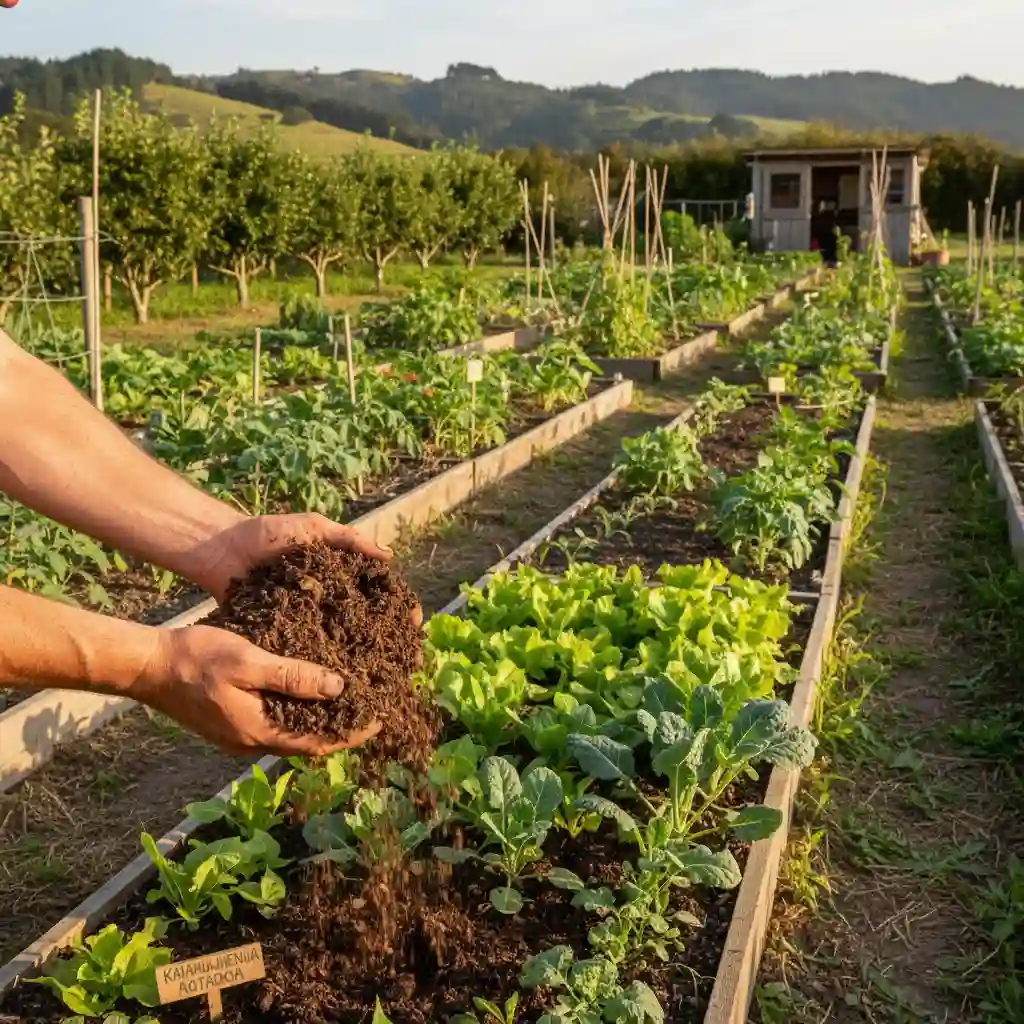
Action Checklist: Your Year-Round Composting Success Plan
Keep this handy checklist to ensure your year-round composting tips for sustainable living in NZ are always in action:
- ✅ Assess Your System: Is your bin/farm suited to your waste and space?
- ✅ Balance Greens & Browns: Always aim for a healthy mix (approx. 1:2 ratio).
- ✅ Maintain Moisture: Keep your compost damp, not soggy or dry.
- ✅ Aerate Regularly: Turn your pile or fork through it for oxygen.
- ✅ Chop Materials: Smaller pieces break down faster.
- ✅ Cover Your Bin: Protect from elements and pests.
- ✅ Adapt Seasonally: Adjust techniques for spring, summer, autumn, and winter.
- ✅ Troubleshoot Promptly: Address odours or slow breakdown quickly.
- ✅ Harvest & Use: Don’t let your finished compost sit unused!
Frequently Asked Questions
Can I compost all year round in New Zealand’s varied climate?
Absolutely! While decomposition naturally slows down in colder months, with proper insulation for your bin (or moving worm farms indoors) and adjusting your additions, you can maintain an active compost system throughout the entire year, even in regions with distinct seasons.
What’s the best way to keep my compost active during a New Zealand winter?
In winter, focus on insulation. Wrap your compost bin with old blankets, cardboard, or bubble wrap. For worm farms, move them to a more sheltered location like a garage or covered deck. Reduce the size of materials added and turn less frequently to retain warmth. Bokashi systems are excellent for managing winter kitchen scraps.
What are ‘greens’ and ‘browns’ in composting, and why is their balance important?
‘Greens’ are nitrogen-rich materials like fresh kitchen scraps (fruit/veg peels), grass clippings, and fresh garden waste. ‘Browns’ are carbon-rich materials such as dry leaves, shredded paper, cardboard, and wood chips. A balanced ratio (ideally 1 part green to 2 parts brown) is crucial for the microbes that break down organic matter, ensuring efficient decomposition and preventing odours.
Can I add meat or dairy to my compost in New Zealand?
For traditional open compost bins or piles, it’s generally not recommended to add meat, dairy, or oily foods as they can attract pests and create foul odours. However, these items can be effectively processed using a Bokashi system, which ferments the waste anaerobically before it’s buried or added to a compost bin for final breakdown.
